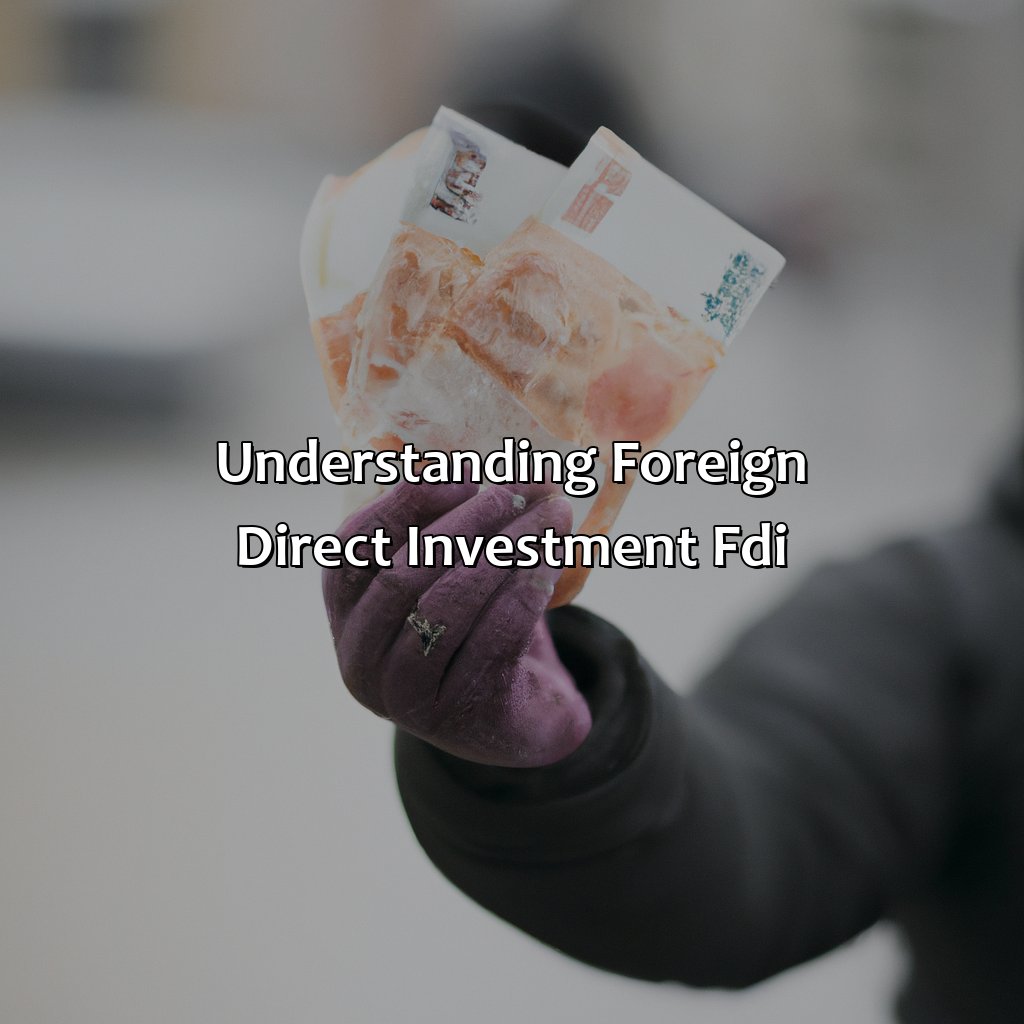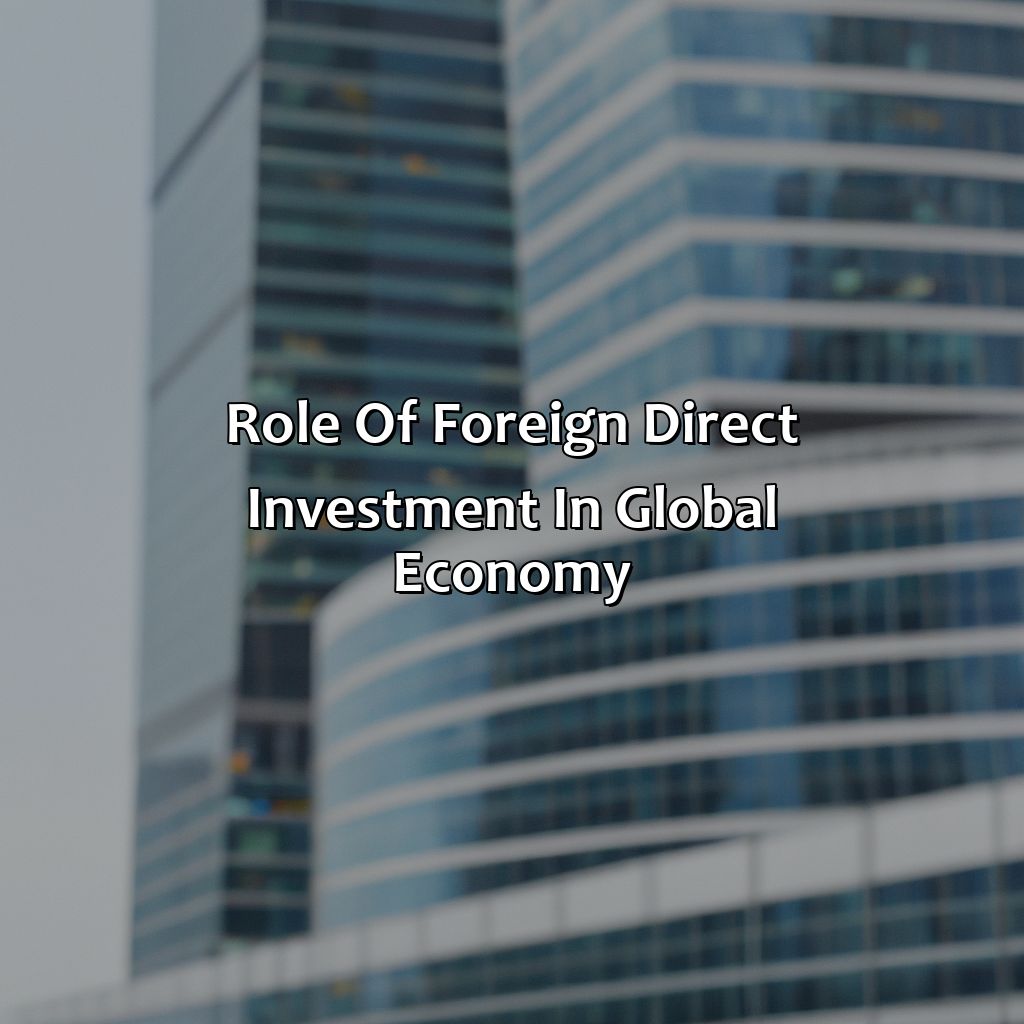What Is A Foreign Direct Investment?
Key Takeaway:
- Foreign Direct Investment (FDI) is an investment made by a company in one country in another country’s economy. FDI can take many forms, including mergers and acquisitions, adding new facilities, or expanding existing ones.
- Some of the advantages of FDI include increased job opportunities, transfer of knowledge and technology, and access to new markets. However, FDI can also have disadvantages, such as the exploitation of resources, loss of domestic control, and negative effects on the environment and social aspects of a country.
- The factors that influence FDI include economic, political, and social factors. These include factors such as the availability of natural resources, political stability, and labor costs.
Are you curious about foreign direct investment? This article will discuss what FDI is, and why it is essential to understand how it works. You’ll learn how it affects businesses, governments, and economies across the globe.
Overview of Foreign Direct Investment
Foreign Direct Investment (FDI) refers to an investment made by a company in one country into another country. FDI is a way for an investor to establish a long-term relationship with a foreign market. By investing in a foreign market, companies can access new customers and become more competitive globally. In addition, FDI can facilitate technology transfer and create jobs.
FDI can take many forms; it can be made through the acquisition of an existing company, the construction of new facilities, or the establishment of a joint venture with a local company. FDIs are often made by multinational corporations to diversify their operations and maximize their profits.
FDI offers numerous benefits to both the investor and the host country. Host countries benefit from increased investment and job creation, which can boost their local economies and increase their competitiveness in the global market. Investors benefit from access to new markets, lower production costs, and reduced trade barriers.
It is important for companies to carefully analyze the risks and rewards associated with FDI before investing. They should consider factors such as political stability, economic environment, labor laws, and potential cultural clashes.

Image credits: retiregenz.com by Adam Woodhock
Understanding Foreign Direct Investment (FDI)
FDI–let’s get to know it!
First, its definition. Then, all the types. After that, let’s learn about the beneficial and not-so-beneficial aspects.
Here’s an introduction to FDI: what it means and what types it includes. Plus, let’s check out the pros and cons!

Image credits: retiregenz.com by Harry Woodhock
Definition of FDI
Foreign Direct Investment (FDI) is when a company or individual invests in and becomes a partial owner of a foreign business entity. This type of investment involves taking an interest in controlling the operations and decision-making processes of the foreign company.
Foreign direct investment can provide numerous benefits, including access to new markets, cost savings, increased efficiency, and competitive advantages. Additionally, it allows for the transfer of knowledge, technology, and management skills between entities.
It is essential to note that foreign direct investment does come with risks such as political instability, changes in legislation or regulation, currency fluctuations, and cultural differences. Therefore, before investing in a foreign business entity thorough research analysis must be conducted to mitigate risks.
Pro Tip: When investing in FDI opportunities consider factors such as political stability of the host country and regulatory environment and carefully assess to make informed decisions.
Foreign direct investment comes in all shapes and sizes, kind of like a box of chocolates, but with much higher risk.
Different types of FDI
There are various forms of foreign investment, which emphasize the different types of FDI. In this section, we explore the diverse categories of FDI by analyzing investments based on their nature and scope.
In Table 1, we examine six primary industries that commonly receive foreign direct investment: Manufacturing, Agriculture, Real Estate, Services, Mining; & Petroleum. Further categorizing these industries into horizontal or vertical investments.
| Industry | Horizontal Investment | Vertical Investment |
|---|---|---|
| Manufacturing | Acquiring an Existing Firm in a Foreign Country’s Market | Building a New Facility in a Foreign Country for Export |
| Agriculture | Purchasing Land or Property in a Foreign Company’s Market | Establishing Contract Farming Agreements with Local Producers |
| Real Estate | Converting Undeveloped Land into Commercial or Residential Development Projects | Developing Existing Properties for Rent |
| Services | Establishing Franchise Operations in a Foreign Country’s Market | Merging with Domestic Service Providers in the Host Country |
| Mining & Petroleum | Purchasing Shares of an Existing Firm, Also Known as Portfolio Investments. Production Of Motor Vehicles Or Car Parts For Exports To Home Countries. | Improving Technology And Efficiency Of Number Of Machines; |
Another notable form of FDI is ‘Greenfield’ projects that involve establishing new facilities and operations from scratch. Companies engage in Greenfield investments to gain complete control over operations while remaining receptive to local regulations and culture.
Suppose there is an Acer Computer Corporation that invested $200 million establishes a state-of-the-art manufacturing facility for laptops and computers in China; this would be considered as Greenfield investments.
When it comes to foreign direct investment, the pros definitely outweigh the cons – unless you’re a xenophobic unicorn living in a bubble.
Advantages of FDI
Foreign Direct Investment (FDI) presents numerous benefits to domestic economies. It enables international investors to gain access to new markets, technologies and enhances local employment opportunities while increasing productivity levels. Furthermore, FDI aids in augmenting the level of competition in domestic markets thereby fostering economic growth and innovation.
A well-planned FDI can create immense value for a host country by introducing innovative technology solutions and systems which are unknown previously, enhancing infrastructure development, improving skill sets by upskilling or reskilling employees and increasing industrial competitiveness. FDI can also support the development of nascent industries by injecting capital resources into these upcoming sectors.
In addition to the above-mentioned attributes of FDI, this investment acts as a catalyst bridging capital gaps which supports several critical projects such as transportation, power generation and communication. This creates transformative change to domestic infrastructure while providing immediate investments into job creation initiatives.
Pro Tip: To maximize the benefits derived from FDI inflows, countries should develop policies that incentivize businesses by reducing bureaucracy and increasing transparency.
FDI may bring in foreign capital, but it’s not always sunshine and rainbows – local businesses may end up feeling like extras in their own economy.
Disadvantages of FDI
Foreign Direct Investment (FDI) can have some drawbacks that we need to consider. Here are some things to keep in mind:
- Loss of Economic Sovereignty: When foreign companies invest heavily in a country, they can gain significant control over key industries and resources, which may limit a nation’s economic independence.
- Job Losses: Foreign firms bring their own employees and management, leaving fewer job opportunities for locals. Additionally, when these businesses fall on tough times, they may decide to cut jobs or move operations back home.
- Brain Drain: FDI can lead to the outflow of skilled talent from a host country as local workers take senior positions with foreign-owned firms or choose to leave for these companies overseas.
- Social and Environmental Costs: Foreign investors may prioritize profits over the well-being of local communities and the environment, leading to harmful practices such as pollution or poor working conditions.
- Economic Instability: FDI flow is not always consistent, and sudden pullouts by investors can destabilize economies relying too heavily on these inflows.
It is worth noting that while FDI has its disadvantages, it also brings economic growth and technology transfer to developing countries.
What’s interesting is that according to the United Nations Conference on Trade and Development (UNCTAD), developed countries remain the largest recipients of FDI. In 2020, developed economies such as the United States drew almost 65% of global investment flows despite ongoing shifts towards emerging markets.
Why go through the trouble of scouting for new business opportunities when you can just follow the FDI flowchart?
Factors influencing FDI
Investigate the effects of Foreign Direct Investment (FDI) by looking into the Economic, Political and Social factors that influence it. Each of these components are crucial for decision-making when it comes to FDI. Analyze how each element plays a vital role in impacting FDI prospects.

Image credits: retiregenz.com by Joel Washington
Economic factors
One of the key determinants that drive foreign direct investments (FDIs) are financial factors. These encompass economic indicators such as exchange rates, inflation, interest rates, and taxation levels. Competitive labor costs and wage structures vary across countries influencing FDIs. In addition, infrastructure and transport facilities also impact FDI decisions made by multinational corporations seeking where to expand their business.
Multinationals keenly assess the economic performance of a country before making an FDI decision. They consider factors such as the GDP growth rate trend which strongly impacts consumer spending and confidence levels. They have an inclination towards countries with robust and stable economic environments coupled with low inflation rates to place an FDIs.
Importantly, market size is another facet that influences FDI decisions significantly. Business organizations seek markets with sustainable demand and adequate population sizes that highly benefit the profitability potential of the company.
A famous example is Tesla’s investment in China as they shipped cars from California with a 25% import tax on their vehicles caused losses for them. Tesla had to come up with a Chinese firm to sell its electric-powered cars in China after receiving acceptance from Beijing in 2018. The local factory provides jobs for nearly 10,000 people while taking advantage of lower manufacturing prices than overseas options and supporting sales throughout Asia while avoiding tariffs resulting from trade tensions between China and the US.
Politics and foreign direct investment – because nothing says ‘we want to invest in your country’ like a good old-fashioned bribery scandal.
Political factors
As per recent studies, governmental regulations and policies play a significant role in the success of foreign direct investments (FDI). Policies associated with trade barriers, tariffs, taxation, and subsidies have a substantial impact on attracting FDI. Additionally, political stability, legal framework and transparency in governance can significantly enhance FDI influx.
Governments with favorable policies towards FDI have higher chances of attracting multinational companies (MNCs). Similarly, governments that protect intellectual property rights efficiently have an added advantage. Political instability results in lower FDI inflow due to uncertainty risks and potential loss of investments.
It should be noted that external pressure from international organizations such as the World Trade Organization (WTO) may influence governments to adopt certain economic policies that are favorable for FDIs. Therefore, it is crucial for policymakers to evaluate the potential benefits/risks associated with foreign firms investing locally.
Investors seek stable environments for long-term investment plans. Thus, countries must maintain political stability alongside implementing sound economic policies necessary for maintaining/growing their GDP.
To conclude, political factors play an essential role in whether or not a country attracts a more considerable amount of FDI. Therefore nations must exert efforts towards establishing a stable political environment while also adapting beneficial policies to achieve this goal.
Want to attract foreign investment? Just make sure your country’s social scene is like a good party – diverse, inclusive, and everyone’s invited.
Social factors
The human element plays a significant role in foreign direct investment (FDI) decisions. Cultural beliefs, social customs and political stability can either attract or deter foreign investors. FDI takes into account the host country’s workforce quality, which involves education levels, expertise, and flexibility to employ innovative technologies. Social factors affecting FDI also touch upon the consumer market size and behavior patterns, including trends that steer consumption. This understanding guides businesses to adopt new marketing strategies conducive to the location’s culture.
It is vital that investors assess the level of corruption and crime rates within a country when deciding on an area for investment purposes. Such factors may reflect negatively on company image, working conditions, and productivity. It is not enough for investors to rely solely on government incentives such as tax breaks because unstable social conditions affect their businesses directly.
Studies conducted by the United Nations have shown that an increase in women’s empowerment correlates positively with higher FDI inflows to developing economies such as India and Brazil, supporting a more gender-inclusive approach to entrepreneurship globally.
A report published by Investopedia illustrates how cultural customs affected Wal-Mart’s failure in Germany due to differences in management practices cited as insensitive by German consumers.
Foreign direct investment: bringing capitalism to countries one multinational corporation at a time.
Role of Foreign Direct Investment in Global Economy
To get a better grasp of foreign direct investment and its effects on the global economy, its growth, work opportunities, and international trade, carry on reading. In the proceeding sub-sections, you can acquire a deeper understanding of how FDI can influence distinct parts of the economy. Additionally, you can discover potential advantages it can provide to numerous countries around the world.

Image credits: retiregenz.com by James Arnold
FDI and economic growth
Foreign Direct Investment plays a crucial role in uplifting the global economy. The positive correlation of FDI and economic growth is undeniable. The inflow of capital, transfer of technology, and the establishment of new businesses are few among the many factors that FDI brings to accelerate economic progress.
The impact of FDI on economic growth varies depending on host country policies, human capital development, and trade relationships. Developing nations often witness high benefits from FDI as it creates employment opportunities and promotes infrastructure development. Whereas developed countries usually prioritize strategic investments to enhance their technological competitiveness.
It is essential to note that while FDI positively affects economic growth, there exist threats like resource drain or exploitation that can hinder sustainable development goals. It would be best to focus on maximizing long-term gains while minimizing potential negatives for sustained progress.
Did you know? The highest recipient of FDI in 2020 was China with a total inflow of $149 billion (UNCTAD).
Foreign Direct Investment: creating jobs in other countries so our unemployment rate can feel better about itself.
FDI and employment
Foreign Direct Investments (FDI) play a significant role in the global economy by generating employment opportunities. FDI drives the creation of new industries, expansion of existing businesses and creates jobs across various sectors.
The primary objective of foreign investors is to set up operations in countries with abundant resources, lower labor costs and favorable policies. The inflow of foreign investment brings in technical know-how, management skills and training to local employees to enhance their productivity levels.
Moreover, FDI leads to technology transfers which have a direct impact on local employment, skill development, capacity building and improves overall living standards of people. Technology transfers enable workers to develop specialized knowledge in operating advanced machinery which opens up opportunities for high-paying jobs.
FDI and international trade: Where one country’s money goes to another country’s economy, and both sides end up feeling like they got a deal.
FDI and international trade
The relationship between FDI and global trade is an important aspect of the contemporary economy. FDI has become a key driver of international trade, leading to cross-border investments that promote economic growth and development. The two are tightly intertwined, with FDI creating new markets for exports, supporting global supply chains and promoting market access for foreign companies.
FDI has consistently shown positive impacts on international trade. It is particularly effective at boosting exports by facilitating access to new markets and providing firms with the necessary resources to enter them. Since FDI also helps in the transfer of knowledge, new technologies, managerial skills, production techniques, and more efficient business practices across borders, it can significantly increase productivity and innovation in recipient countries.
Moreover, as foreign investors seek economies of scale by setting up subsidiaries or acquiring existing companies in host countries during their process of globalization, they boost exports from these host countries. This happens where production costs are comparatively lower than their home country as it becomes profitable for companies to import inputs from those specific regions.
To ensure further benefits from this dynamic interplay between FDI and international trade, policymakers need to stay abreast of changing global trends while maintaining an enabling environment that fosters investment. They should introduce policies that facilitate freer flows of goods and services globally while maintaining high standards for national treatment and transparency. For example; investment-friendly policies like liberalizing market access restrictions through free-trade agreements (FTAs) helps reduce both trade barriers as well as provide regulatory certainty for investors looking to expand overseas. By adopting gradual structural reform characterized by flexible regulation which adapts to market conditions becoming less restrictive over time it creates favourable soil for investors further propelling international trade through FDI.
Some Facts About Foreign Direct Investment:
Foreign direct investment (FDI) is an investment made by a company or individual in one country into a business located in another country. (Source: Investopedia)
FDI can be in the form of acquiring a controlling interest in an existing foreign company, or starting a new business operation in a foreign country. (Source: The Balance)
FDI can provide benefits to both the investing company and the host country, such as job creation, transfer of skills and technology, and access to new markets. (Source: UNCTAD)
The United States is the largest recipient of FDI, followed by China, Hong Kong, and Singapore. (Source: OECD)
FDI can also have negative effects, such as exploitation of natural resources, labor rights violations, and pressure on domestic governments to loosen environmental and social regulations. (Source: World Bank)
FAQs about What Is A Foreign Direct Investment?
What is a foreign direct investment?
Foreign Direct Investment (FDI) is when a company or individual invests in a business or production facility in another country. This investment can take many forms, including equity stakes, joint ventures, and wholly-owned subsidiaries.
What are the benefits of foreign direct investment?
Foreign Direct Investment brings many benefits, including access to new markets, increased revenue, expanded customer base, access to cheaper labor and raw materials, and increased efficiency through the transfer of technology and know-how.
How does foreign direct investment differ from other forms of investment?
Foreign Direct Investment is different from other forms of investment because it involves a long-term commitment to a foreign jurisdiction. FDI requires significant resources, including capital, expertise, and technology, and is often accompanied by a transfer of key personnel and intellectual property.
What are the risks associated with foreign direct investment?
Foreign Direct Investment carries many risks, including political instability, currency fluctuations, changes in tax laws, regulatory obstacles, and cultural differences. Companies must carefully evaluate these risks and develop strategies to mitigate them before investing in a foreign market.
What are some examples of foreign direct investment?
Some examples of Foreign Direct Investment include Toyota’s production facilities in the United States, Walmart’s acquisition of India’s Flipkart, and Ford’s investment in manufacturing plants in Mexico. These examples demonstrate the broad range of sectors and industries that can benefit from FDI.
How can a business attract foreign direct investment?
To attract foreign direct investment, a business must create a welcoming and supportive investment climate. This may involve creating a favorable tax environment, providing streamlined administrative procedures, and developing infrastructure that supports businesses. Additionally, businesses can engage in outreach efforts to attract foreign investors by creating marketing materials and attending industry conferences.
 Checkout this IRS Loophole
Checkout this IRS Loophole 
